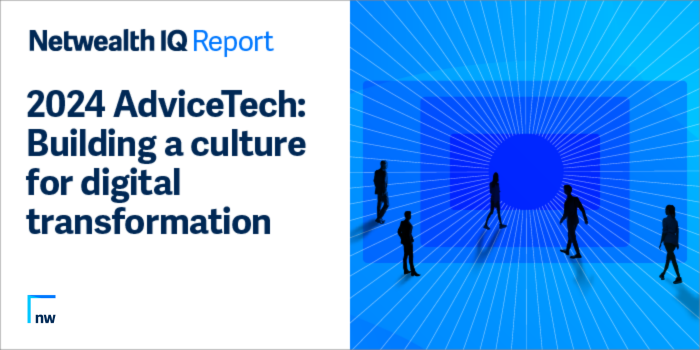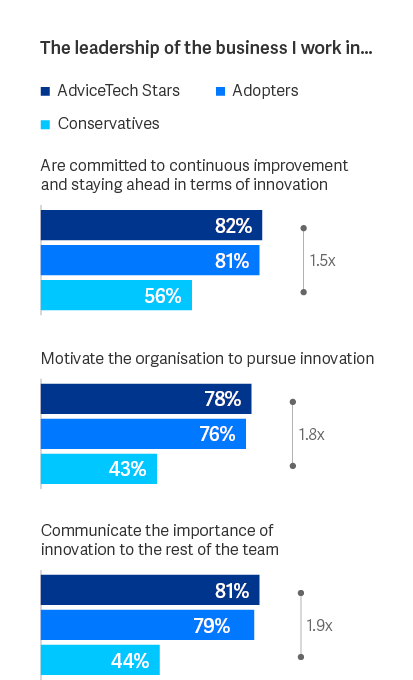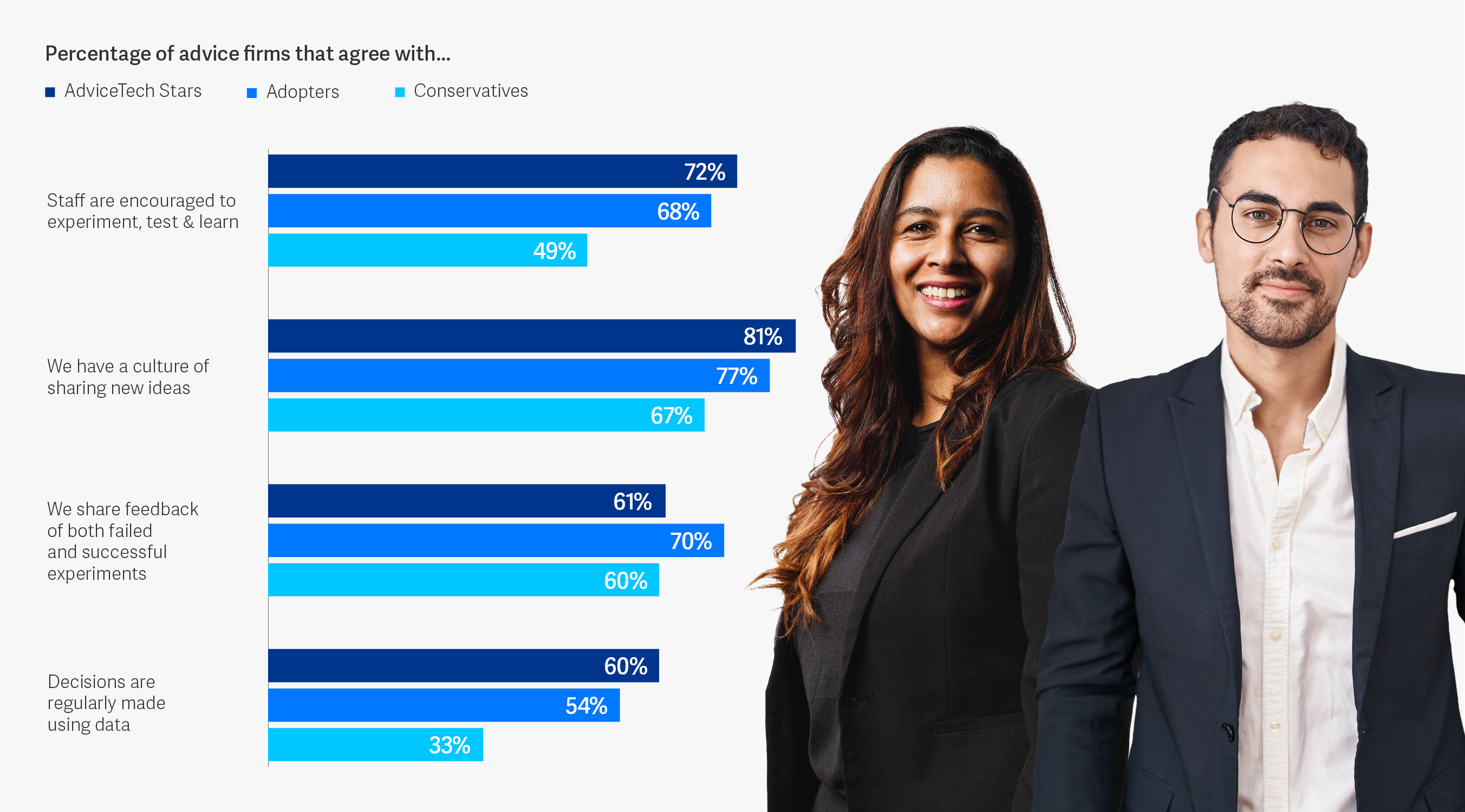General Use: This document is for general use. Modification of content is prohibited unless you have Netwealth’s express prior written consent.

Digital transformation is a challenge for many advice firms, but some businesses do it better. Based on Netwealth’s 2024 AdviceTech research, we look at the attributes of leadership and culture that impact a firm’s digital maturity.
Key takeaways:
• Top-performing firms share common strategies for digital success.
• Leadership must align to drive digital transformation.
• Cultural traits, such as a willingness to experiment, impact digital maturity.
Recently, Chinese firm Alibaba developed an AI engine called Emote Portrait Alive, which crafts video clips with facial expressions and head movements from a single image of a person, blurring the lines between reality and AI like never before. This is just one of the many, many new technologies that are becoming available with the potential to change our lives, as well as our businesses.
As an industry, financial advice is finding it a challenge to keep up. While the majority of firms are using at least 15 pieces of technology in their practice, according to Netwealth’s 2024 AdviceTech research, only one in 10 advice firms are able to maximise the benefits of integration.
The effect of this is double-handling of data, inefficiencies switching between software with different interfaces, inabilities to leverage the power of data for insights, and being unprepared for AI.
And with only one in 10 firms able to claim that their technology is pervasive in all client interactions, it’s clear that the industry as a whole is not meeting the expectations of clients, who use social media, search engines, mobile apps, and other online tools almost constantly.
Many of the barriers for advice firms wanting to undergo digital transformation come back to the organisation itself, including lack of focus, cultural resistance and funding limitations. For many, prioritising digital transformation is a big challenge.
From the findings of Netwealth’s 2024 AdviceTech research, we have identified how leading advice firms which we call ‘AdviceTech Stars’, overcome these challenges and barriers. To help understand this, we developed the ‘Netwealth Digital Maturity Framework’, made up of 40 drivers of digital maturity, combined into four main pillars:
1. Leadership – having leaders who are invested, see the benefits of technology and digital transformation, and are willing to take reasonable risks.
2. Culture – having a culture that is flexible with empowered staff that experiment and use technology for the benefit of the business.
3. Digital Strategy – having a medium to long-term plan for digital transformation and allocating appropriate capital to it.
4. Process of Change – having an organisation that has processes and doesn’t assume technology deployment is easy but knows it takes work and resources to get right.
In this article, we look at how leadership and culture help build an organisation that is ready for digital transformation.
Starting with leadership
In 1957, the Soviet Union started the space race by launching the satellite Sputnik. Five years later, in 1962, President John F. Kennedy made an innovative declaration which inspired the nation, to “go to the moon in this decade”.
This highly ambitious vision was a powerful catalyst for innovation, and just seven years later, astronaut Neil Armstrong set foot on the Moon.
Just as JFK did for his country, leaders must be dedicated to innovation and establish ambitious, measurable goals for their organisation. They must define a guiding star for innovation and ensure their team is comfortable pursuing it.

This is a distinct trait of AdviceTech Star leaders, with approximately eight out of 10 (82 per cent) of them dedicated to continuous improvement and staying ahead of the curve. More importantly, eight out of 10 Stars (78 per cent) report that their leaders inspire the organisation to pursue innovation and also (81 per cent) effectively communicate its significance to the rest of the team.
Importantly, AdviceTech Star leaders also agree that there cannot be any conflict at the board table. In fact, 73 per cent of Stars say their leaders are aligned when it comes to IT and digital initiatives.
Case study: Aligning staff with a manifesto1
Pharmaceutical company Moderna achieved what was previously thought impossible by delivering a Covid-19 vaccine for human clinical trials a mere 42 days after finalising its vaccine sequence.
When the Covid-19 pandemic was declared by the World Health Organisation in March 2020, Moderna had less than a thousand employees. That has since expanded over five times.
But this period of growth raised a big challenge for Moderna, as new talent from larger, more traditional pharmaceutical firms could potentially water down the innovative spirit upon which Moderna was built.
So Moderna collaborated with design firm IDEO to capture this innovative culture into a series of “Mindsets.” For example: “Opportunity is born from risk,” “Adaptation signifies progress,” and “Strive beyond the conceivable…”
These Mindsets have simplified the process of aligning with of the company’s ethos for new and longstanding employees alike.

A culture of experimentation and risk
When it comes to digital adoption, it’s not just about leaders supporting change, but actively creating a culture that drives this forward.
A great example of how a company does this well is Adobe. The company’s Kickbox program, which it launched in early 2013, gave employees a bright red box with a $1,000 credit card to use to create what they want. After going through various stages including pitching ideas to leaders, successful ideas got rewarded with a mysterious blue box with more resources to help bring their innovation to life2. Nowadays, Kickbox is one of the world’s most popular open-source innovation frameworks.
Netwealth’s 2024 AdviceTech research identified several characteristics of a culture of experimentation among AdviceTech Stars.
The first is genuine encouragement of experimentation, with almost three-quarters (72 per cent) of Stars believing this is a characteristic of their business.

Sharing ideas with teammates and throughout an organisation helps to encourage dialogue and investigation. This is the second attribute of experimentation, that is, sharing new ideas among staff (81 per cent of Stars exhibit this). Atlassian, one of Australia’s largest software companies, uses a concept called ‘respectful dissent’ when sharing ideas, which means people feel comfortable to voice thoughts, ask questions and engage in respectful disagreement, without fear of looking stupid or reprisal3.
The third characteristic of experimentation is that staff candidly share feedback on the experiment itself, including both failed and successful experiments. This trait is adopted by 61 per cent of Stars.
And finally, it is critical that any experiment has a hypothesis to test, typically made up of a set of assumptions and tested against an outcome using data. Stars agree, with six in 10 stating that the business they work in typically makes decisions regularly using data.
Underpinning this is a culture accepting of some levels of risk in technology deployment. As Ed Catmull, co-founder of Pixar, a company that continually innovates and uses technology in novel ways, says: “It is not the manager’s job to prevent risks. It is the manager’s job to make it safe to take them”4.
AdviceTech Star businesses recognise this, with almost seven in 10 (66 per cent) saying their leaders are open to taking risks on new technology, and six in 10 (58 per cent) encouraging staff to take risks with new ideas.
Diverse and empowered staff
Interestingly, our research indicated a common characteristic of digital maturity is having staff who are diverse in thought, skills, and background, with seven in 10 AdviceTech Stars indicating this as a success factor for their business.
Not surprisingly, eight in 10 (79 per cent) of Stars also have staff that are more open to adopting new technologies and innovation.
Atlassian, says “demographically diverse teams tend to generate more creative solutions and stronger outcomes…So their goal is to have people with a variety of identities, life experiences, and skills on each team”5.
Also, digitally mature organisations empower their team with knowledge. This means continuously training staff on new technologies and digital skills and ensuring they feel they have the support and resources to adapt to digital changes.
Formal training for developing these skills is one approach, but cultivating an environment that allows on-the-job learning may be more effective – through practice and experience.
For example, one way to learn on the job is hackathons.
You don’t need to be an IT company to run a hackathon
Tech companies, like Netwealth, run regular hackathons. In a recent hackathon, Netwealth looked at the problem of how to improve processes, products or the advice ecosystem using artificial intelligence (AI). Over two days they built several prototypes, including an AI compliance-related system, a tool to help developers code better, a generative AI portfolio report, and an AI knowledge base for staff.
One of the defining successes of the day was that a substantial number of people got involved, and many were not from the IT team.
Hackathons are not just for tech companies but can be used in advice practices too. To run a hackathon, try this simple formula:
• Get small teams together to create ideas and solve challenges
• Ask the teams to generate a prototype or test a hypothesis – the output doesn’t have to be a working solution
• Gather feedback on the project, ideally from the users themselves
• Ask teams to create an ‘elevator pitch’ on their project and present it to senior leaders.
There’s plenty of groundwork to lay when it comes to building an organisation that’s ready for digital transformation, and focusing on leadership and culture is a good place to start.
Reference
1. https://www.ideo.com/works/moderna
2. https://www.forbes.com/sites/mzhang/2015/08/19/adobe-kickbox-gives-employees-1000-credit-cards-and-freedom-to-pursue-ideas/
3. https://www.atlassian.com/blog/inside-atlassian/how-to-build-culture-of-innovation-every-day
4. https://www.goodreads.com/quotes/7393015-similarly-it-is-not-the-manager-s-job-to-prevent-risks
5. https://www.atlassian.com/blog/inside-atlassian/how-to-build-culture-of-innovation-every-day

